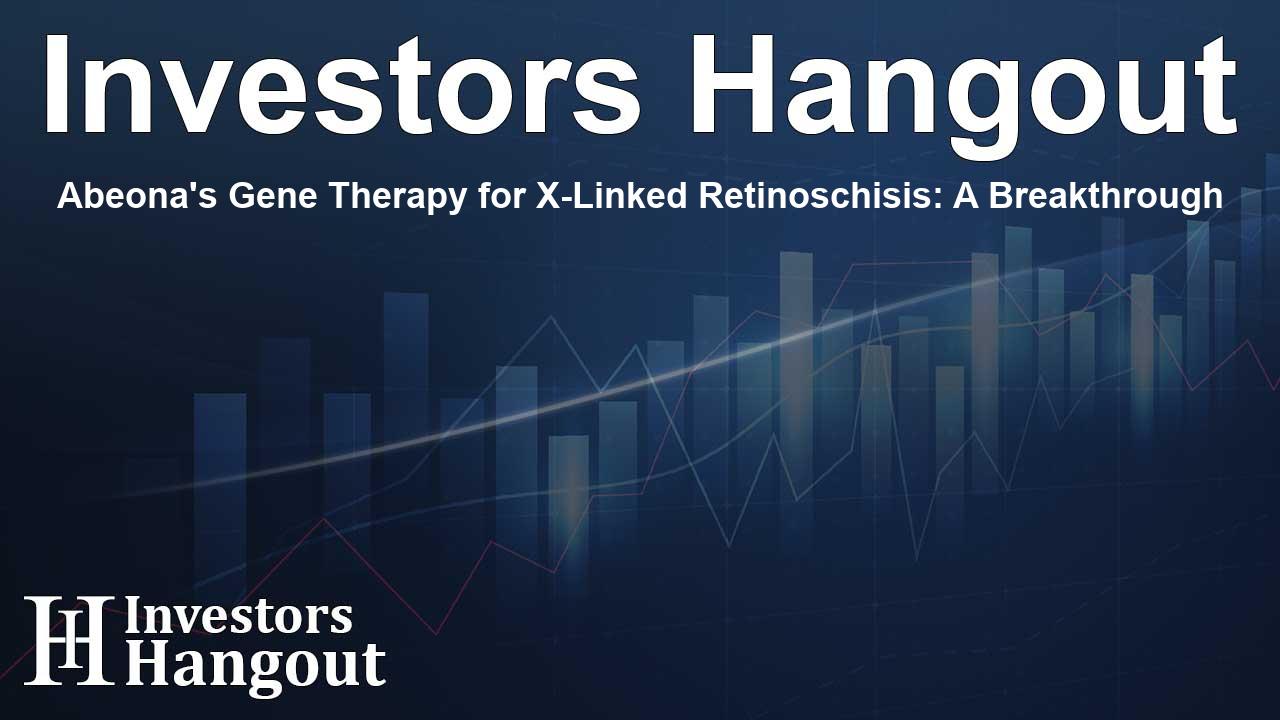Abeona's Gene Therapy for X-Linked Retinoschisis: A Breakthrough

Abeona Therapeutics Gains FDA Selection for Gene Therapy
Today, Abeona Therapeutics Inc. (NASDAQ: ABEO) proudly announces that its innovative ABO-503 gene therapy for X-linked retinoschisis (XLRS) has been selected for the FDA's Rare Disease Endpoint Advancement (RDEA) Pilot Program. This initiative is designed to better support the development of treatments for rare diseases by allowing for novel efficacy endpoints in clinical trials.
Opportunities for Enhanced Collaboration with the FDA
With the RDEA program, Abeona will engage more closely with the FDA, benefitting from frequent guidance and discussions which can propel the development of their XLRS program. According to Vish Seshadri, CEO of Abeona, this recognition underscores the urgent need for therapies targeting XLRS and reflects their commitment to improving clinical outcomes for patients.
The Importance of ABO-503 in Treating XLRS
ABO-503 incorporates the human RS1 gene, strategically packaged within the AIM™ capsid AAV204. Preclinical studies have demonstrated promising results in a mouse model of XLRS, showing improvements in both structure and function across the retina. Specifically, ABO-503 has exhibited potential in enhancing cone photoreceptor density and overall cell survival, which could lead to significant advancements in visual function.
Projected Milestones for Abeona’s Development Pathway
Abeona is progressing towards the completion of Investigational New Drug (IND)-enabling studies anticipated by the second half of the next year, marking a critical step in the regulatory process for bringing ABO-503 to patients suffering from this rare condition.
Understanding X-linked Retinoschisis (XLRS)
XLRS is a rare genetic disorder that leads to serious vision problems, primarily affecting males. The condition stems from mutations affecting the RS1 protein, which plays a crucial role in retinal health. Without intervention, XLRS can lead to deteriorating eyesight and, in severe cases, legal blindness. The rarity and severity of this disease highlight the importance of developing effective gene therapies like ABO-503.
Abeona Therapeutics and Its Broader Impact
Abeona Therapeutics is at the forefront of developing cell and gene therapies aimed at addressing significant unmet medical needs. Their leading product, ZEVASKYN®, represents a breakthrough in treating genetic conditions affecting the skin. With a manufacturing facility in Cleveland focused on AAV-based therapies, Abeona’s mission extends well beyond XLRS, as they work on multiple gene therapies for various debilitating inherited diseases.
Commitment to Innovation and Gene Therapies
The growing focus on innovative therapies, such as ABO-503, reflects Abeona's dedication to ushering in a new era of treatment options for patients with conditions like XLRS. With a solid understanding of the genetic factors involved, early interventions through gene therapy show promise in slowing or reversing the progression of these diseases.
Frequently Asked Questions
What is ABO-503 and its purpose?
ABO-503 is a gene therapy developed by Abeona Therapeutics aimed at treating X-linked retinoschisis (XLRS) by delivering a functional RS1 gene to the retina.
Why has the FDA selected this therapy for the RDEA program?
The FDA selected ABO-503 to facilitate improved communication and collaborative opportunities to expedite its development and validation of new efficacy endpoints in clinical trials.
What are the projected benefits of the RDEA Pilot Program?
This program aims to accelerate the approval of therapies for rare diseases by allowing for innovative efficacy endpoints to be considered during the validation process.
What is X-linked retinoschisis?
XLRS is a rare genetic disease characterized by the breakdown of retinal structure and function, leading to significant visual impairment and potential blindness.
How does this selection impact Abeona’s future?
Abeona's selection for the RDEA pilot program places the company in a stronger position for developing treatments, enhancing their clinical development pathways and opportunities for innovation.
About The Author
Contact Addison Perry privately here. Or send an email with ATTN: Addison Perry as the subject to contact@investorshangout.com.
About Investors Hangout
Investors Hangout is a leading online stock forum for financial discussion and learning, offering a wide range of free tools and resources. It draws in traders of all levels, who exchange market knowledge, investigate trading tactics, and keep an eye on industry developments in real time. Featuring financial articles, stock message boards, quotes, charts, company profiles, and live news updates. Through cooperative learning and a wealth of informational resources, it helps users from novices creating their first portfolios to experts honing their techniques. Join Investors Hangout today: https://investorshangout.com/
The content of this article is based on factual, publicly available information and does not represent legal, financial, or investment advice. Investors Hangout does not offer financial advice, and the author is not a licensed financial advisor. Consult a qualified advisor before making any financial or investment decisions based on this article. This article should not be considered advice to purchase, sell, or hold any securities or other investments. If any of the material provided here is inaccurate, please contact us for corrections.
